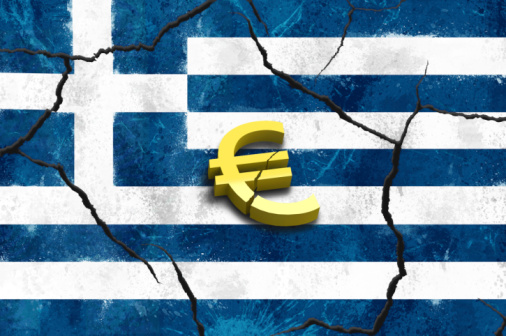The situation in Greece literally has become laughable from a non-European’s view. Greece’s socialist Syriza party and the ministers are very obviously torpedoing every debt repayment and restructuring negotiation effort. What is equally laughable is that the Europeans keep playing this shell game with the weakest link in the euro. While this situation could get resolved in this particular case (or not), the problem in allowing Greece to keep playing this economic shell game is that no deal the nation agrees to actually matters in the months and years ahead.
Let’s just assume that Prime Minister Alexis Tsipiras and Finance Minister Yanis Varoufakis decide to capitulate and stop trying to renege on their existing debt terms. There is just no assurance that they will not be back with new demands months from now.
What now makes dealing with the nation of Greece more untenable than ever is that Greek politics allows the nation to try to play the child’s game of do-over, but with real, adult-sized debt. All that has to happen is a vote of confidence has to be called, and a no-confidence vote can result in parliament effectively being disbanded with a call for new elections. Then, if a new regime with a different set of goals and unbelievable election promises manages to win, they can just go back to the creditor table and demand new payment terms ahead of or on the day of the next debt and interest payment.
ALSO READ: The Next Big Dividend Hikes You Can Bank On This Summer
Investing in Greece has also become a total joke. National Bank of Greece S.A. (NYSE: NBG) was down only about 3% at $1.41 on Thursday morning in New York American depositary share trading. With a 52-week range of $0.98 to $4.16, it is almost amazing that the shares are not lower. It is also amazing that the short interest of 15.5 million in mid-May is down almost by half from just a month earlier. Do investors realize that Greece’s socialists could at any time try to nationalize the banks?
Try this Dow Jones headline from the end of May on for size: Greek Bank Deposits Fall to Lowest Level in More Than 10 Years. The European Central Bank showed that Greek bank deposits fell to €139.36 billion in April, down from €145.04 billion in March and from over €170 billion in late 2014. Take a gee-whiz guess why those deposits keep falling. Could it be that Greek depositors know that their government could simply seize the banks, and maybe that they would not be made whole on their deposits too? It happened in Cyprus.
The Global X FTSE Greece 20 ETF (NYSEMKT: GREK) is another sad example of an exchange traded fund that just cannot be helped under the current situation. Its drop of 1.5% to $12.57 Thursday is against a 52-week range of $9.76 to $24.58. The GlobalXFunds website shows that the fund amazingly has about $322 million in assets, and its mid-May short interest was not even 500,000 shares.
ALSO READ: 5 Stocks That Warren Buffett Should Sell
The National Bank of Greece is the most liquid U.S.-listed stock that is a daily trading vehicle around the sentiment of Greece’s future. Over the past month, there has been a much more negative headline tone, if you look on Yahoo! Finance:
- TheStreet: National Bank of Greece Stock Climbing as Creditors Willing to Compromise (June 3)
- TheStreet: Sell National Bank of Greece and 3 Other Big Bank Stocks (June 3)
- WSJ: Greek Banks Increasingly Rely on ECB Funding (May 28)
- Bloomberg: Greek Bank Losses Show Predicament Amid Record Outflows (May 28)
- TheStreet: National Bank of Greece Stock Advancing on Debt Draft Speculation (May 27)
- Barron’s: Greece: Hope Isn’t Investable (May 27)
- Bloomberg: Greek Banks Face Contingency Plans as Crisis Threatens (May 22)
- Barron’s: Greece: Risk Of Capital Controls ‘Substantial’ (May 20)
- Moody’s: Alpha Bank AE — Moody’s outlook for Greece’s banking system is negative (May 20)
- Barron’s: Greece: Default Risk ‘Real,’ Fitch Holds Rating (May 15)
- Barron’s: What German, Greek Banks Have In Common (May 1)
Why do the Europeans, and anyone else for that matter, continue to play this game with Greece? The markets have been trying to factor the economic value of Greece in the euro down to zero. Holders of Greek debt have already taken massive haircuts. Until the Greeks are forced to live up to prior written and agreed-to governmental commitments, this is a shell game that just may never end.
For years investors have referred to the peripheral nations of the eurozone as the PIIGS, for Portugal, Italy, Ireland, Greece and Spain. As long as the socialist regime keeps getting to hold the rest of the euro hostage, 24/7 Wall St. would like to propose that the PIIGS acronym be changed to the GIIPS.
ALSO READ: The 6 Stocks Punishing the Dow in 2015
Take Charge of Your Retirement In Just A Few Minutes (Sponsor)
Retirement planning doesn’t have to feel overwhelming. The key is finding expert guidance—and SmartAsset’s simple quiz makes it easier than ever for you to connect with a vetted financial advisor.
Here’s how it works:
- Answer a Few Simple Questions. Tell us a bit about your goals and preferences—it only takes a few minutes!
- Get Matched with Vetted Advisors Our smart tool matches you with up to three pre-screened, vetted advisors who serve your area and are held to a fiduciary standard to act in your best interests. Click here to begin
- Choose Your Fit Review their profiles, schedule an introductory call (or meet in person), and select the advisor who feel is right for you.
Why wait? Start building the retirement you’ve always dreamed of. Click here to get started today!
Thank you for reading! Have some feedback for us?
Contact the 24/7 Wall St. editorial team.


